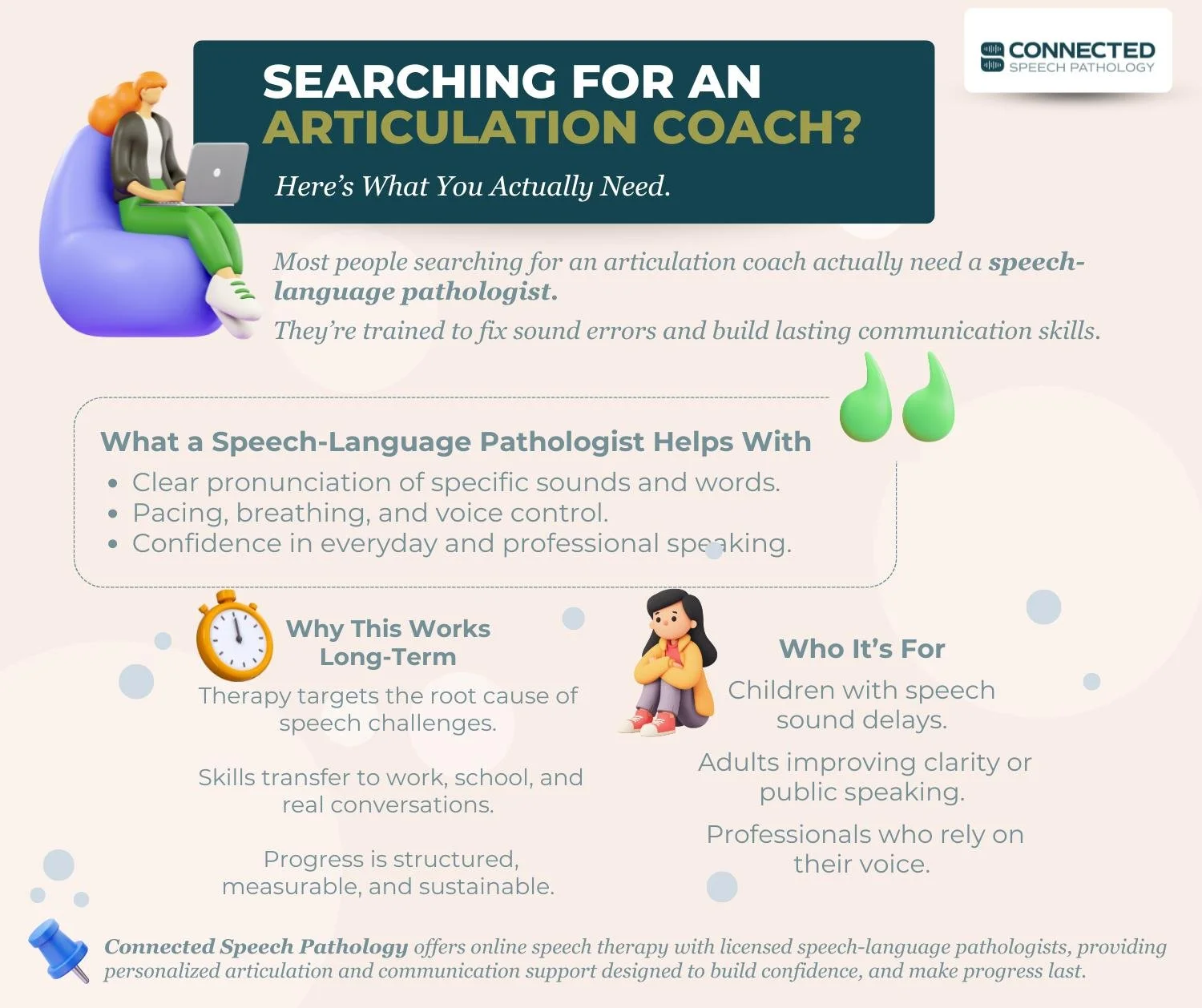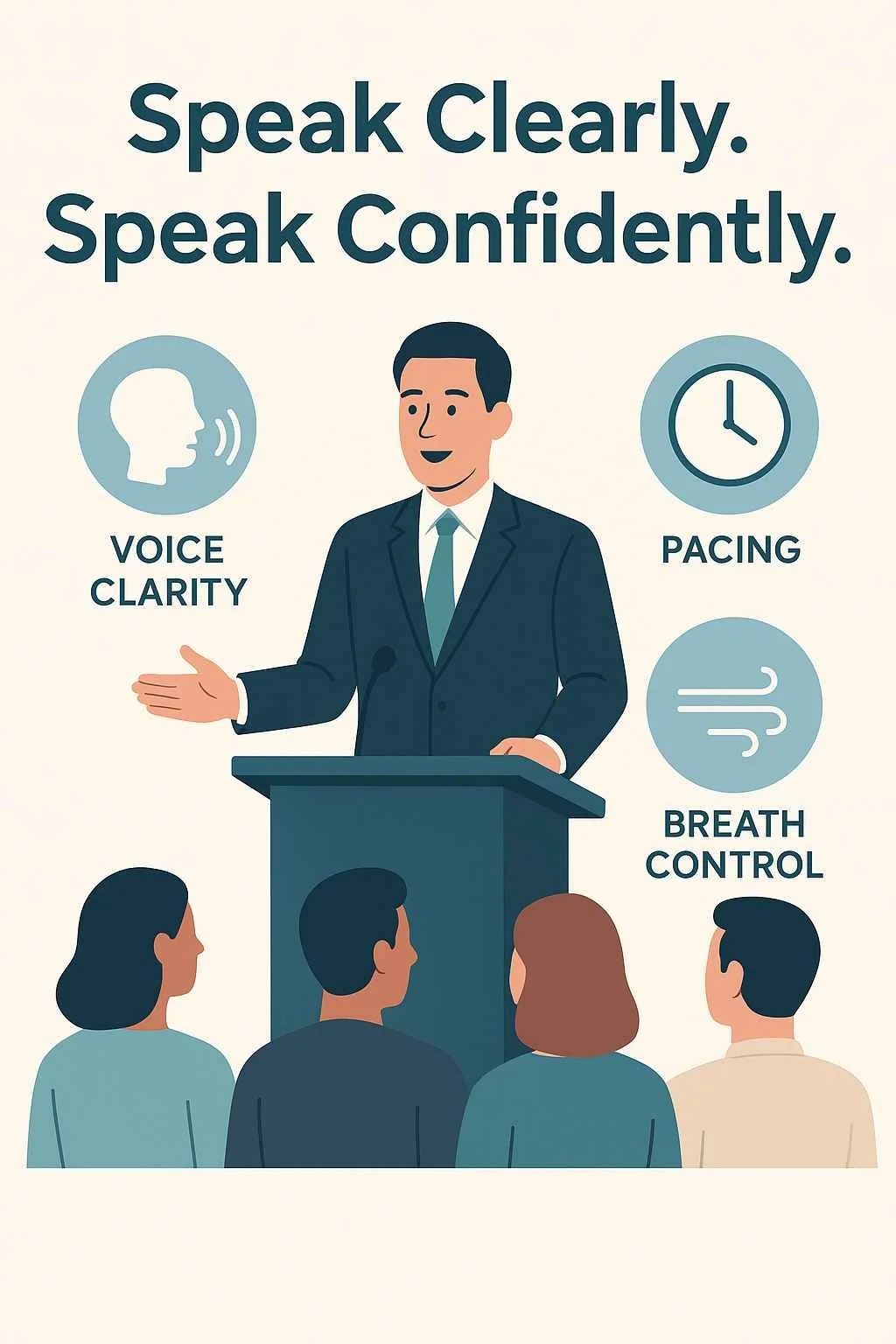Searching for an Articulation Coach? Here’s What You Actually Need
Finding the right support for communication challenges can feel confusing. Many people search for an articulation coach, but what they are actually looking for is a speech-language pathologist. Understanding this helps you choose care that builds confidence and lasting skills.
Key Takeaways
A speech-language pathologist helps people pronounce certain words and sounds more clearly through structured speech therapy.
Speech therapy improves communication skills for children, college students, and adults in professional or social situations.
Speech therapists use evidence-based strategies that address both speech sounds and confidence in communication.
Online services make it easy to connect with licensed specialists from any location. In-person options are also available.
What Does a Speech-Language Pathologist Do with Certain Words and Sounds?
Why a Speech-Language Pathologist Supports Long-Term Communication
Benefits of Expert Coaching and Expert Guidance from a Licensed Professional
Techniques Speech Therapists Use to Improve Articulation and Clarity
Who Can Benefit from Speech Therapy and Public Speaking Support?
Frequently Asked Questions About Speech-Language Pathologists
What Does a Speech-Language Pathologist Do with Certain Words and Sounds?
A speech-language pathologist works with clients to improve how they pronounce certain words and sounds. For adults, speech therapy often focuses on clarity in public speaking, conversation, and presentations. Many speech therapists also guide adult clients on pacing, breathing, and voice delivery.
Speech therapy sessions for adults and children are based on research on articulation. A speech therapist identifies the specific speech sounds that need improvement and provides exercises to practice them. This process helps adults and children speak more clearly and confidently in everyday life.
What Does a Speech Pathologist Do
For more information about what a speech pathologist does, check out our blog!
Why a Speech-Language Pathologist Supports Long-Term Communication
Speech-language pathologists are licensed professionals who treat speech-language, fluency and voice challenges, as well as overall communication needs. They use structured lessons and practice strategies to build both clarity and confidence. Clients learn skills that apply to school, work, and leadership roles.
Speech therapy is more than just adjusting how you sound. It addresses the root cause of speech challenges and provides strategies for long-term development. This creates lasting improvement and a stronger presence when speaking with others.
Speech Improvement for Public Speaking and Presentations
Public speaking is one of the most common reasons adults seek help from a speech-language pathologist. Coaching focuses on accurate sound production, clarity of words, and confidence when speaking to an audience.
Speech therapists also help clients organize ideas into a clear story for presentations, leadership talks, or lessons. This support makes it easier to connect with an audience, deliver a message, and present with confidence.
Benefits of Expert Coaching and Expert Guidance from a Licensed Professional
Clients learn how to speak with clarity, project their voice, and practice techniques that improve both everyday conversation and professional communication.
Sessions with a speech therapist help clients become more confident in speaking situations. Leaders, executives, and teams often use therapy to strengthen communication skills and build a consistent brand presence. This combination of expert guidance and structured practice supports growth in career and life.
Techniques Speech Therapists Use to Improve Articulation and Clarity
Speech therapists use specific techniques to improve how clients speak. These include articulation exercises, pacing strategies, and voice techniques. For example, a speech therapist may teach tongue placement for certain sounds or breathing control for steady delivery.
Clients also practice in real speaking situations, such as presentations, conversations, or reading aloud. Structured writing and speaking exercises connect ideas with delivery. Real-time feedback from a speech therapist helps clients correct mistakes and develop clear, confident speech.
Who Can Benefit from Speech Therapy and Public Speaking Support?
Children benefit from speech therapy when they have delays in speech sound development. Speech therapy helps children improve clarity at school and in conversations with friends. College students preparing for presentations or group discussions also gain skills that support confidence and clarity.
Adults often seek therapy to improve public speaking, presentations, or professional communication. Executives, sales professionals, and speakers use therapy to strengthen their voice and delivery. People working in sales, delivering podcasts, or recording audiobooks benefit from professional feedback that improves clarity and performance.
Frequently Asked Questions About Speech-Language Pathologists
1. What does a speech-language therapist do?
A speech-language pathologist helps clients improve clarity, sound production, and overall communication. Therapy focuses on certain words and sounds that are difficult to pronounce and builds confidence in speaking. Sessions are structured with exercises, strategies, and feedback.
2. Can speech therapy help with public speaking?
Yes, speech therapy helps adults achieve clarity and confidence for public speaking. Speech therapists provide strategies for pacing, confidence, and audience connection. This makes presentations and leadership communication easier and more effective.
3. How long does articulation therapy take?
Articulation therapy varies based on the client’s needs and goals. Some people notice progress in a few months, while others require longer for consistent improvement. A speech therapist creates a plan with clear goals and structured lessons.
4. Do adults benefit from speech therapy?
Yes, adults benefit from speech therapy when they struggle with certain words, accents, or public speaking confidence. Therapy provides structured practice, strategies, and professional feedback that improve both personal and professional communication.
5. Is online speech therapy effective?
Online speech therapy is effective because it provides real-time practice with a licensed speech therapist through video sessions. Clients receive the same structured lessons and feedback as in-person therapy. Many people prefer online sessions for convenience and consistency.
How Connected Speech Pathology Can Help with Articulation
Connected Speech Pathology provides online articulation therapy with licensed speech-language pathologists. Clients receive structured exercises, expert guidance, and ongoing support from knowledgeable professionals. Therapy is delivered virtually, making it easy to connect with specialists regardless of location.
The knowledgeable team at Connected Speech Pathology supports both individuals and groups, guiding clients through structured practice designed to enhance communication in all areas of life. Services include therapy for articulation, public speaking, accent modification, and overall confidence in conversation. This expert coaching helps clients reach personal and professional goals.
Summary
A speech-language pathologist helps clients improve clarity, confidence, and presence in communication. Therapy addresses sound errors, voice delivery, and confidence in both personal and professional speaking situations.
Clear communication changes how you connect with others. It strengthens relationships, enhances career opportunities, and builds confidence in life. Working with a trained professional ensures progress that lasts.
About the Author
Allison Geller is a communication coach, speech-language pathologist, and founder of Connected Speech Pathology, an international online practice providing professional communication coaching and speech therapy for children, teens, and adults. With more than two decades of experience, she has worked in medical and educational settings, published research on aphasia, and leads a team of specialists helping clients improve skills in public speaking, vocal presence, accent clarity, articulation, language, fluency, and interpersonal communication.










